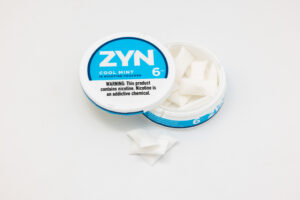
Robert Mitchell has worked at the Tobacco Superstore on Jackson Avenue for almost a year and a half. While the store sells a range of products, Mitchell said University of Mississippi students are coming in increasingly for one thing: Zyn.
Zyns are small pouches filled with a white powder that contain three or six milligrams of synthetic nicotine. Users insert the pouch orally for a head buzz and dispose of the pouch when the effects wear off.
“Seems like younger people, by a wide margin, are taking a liking to Zyn over anything else we offer,” Mitchell said. “The college students down here … nine out of 10 of them are buying Zyn.”
Phillip Morris International, which owns Zyn, reported 131.6 million cans of Zyn sold in Q1 of 2024 — an 80% increase over last year. The increase in demand, as well as a court challenge that ended in a temporary halt of online sales, has caused a nationwide shortage, which some online social media personalities have dubbed the “Zyndemic.”
“Zyn has gotten more and more popular up to now, and it seems like mostly everyone near us is out because of the shortage,” Mitchell said. “We can’t fill all their orders right now … we’re definitely missing out on a lot of business because of it.”
In wake of the “Zyndemic,” UM students shared why they are still seeking Zyn.
Preston Hoover, a senior mechanical engineering major from Houston, recently turned to using Zyn in an effort to quit vaping.
“I definitely felt the effects of vaping before, nothing super major, just shortness of breath when I was working out and getting more anxious about certain things. … (Zyns) are a lot easier on me than vaping,” Hoover said.
Gannon Stringer, a senior biochemical engineering major from Gulfport, Miss., said that his Zyn use is a matter of convenience.
“It’s a thousand times more convenient because you can do whatever you want with a Zyn in, and nobody really notices,” Stringer said.
For Stringer, cost is a major selling point
“A day’s worth of cigarettes is like one pack. So (if) you smoke a pack of cigarettes a day, it costs you $8 or $9 a day,” Stringer said. “But some people use only like two packs of Zyns a week, which is also roughly $10 because the government hasn’t put a big tax on it, so it just makes sense.”
Mitchell sells Zyns for $5.87 per can including tax.
Students have also noted a culture surrounding Zyn, even those who do not partake.
“I’ve seen people out at bars share them with their friends, and they’re like, ‘Oh do you want a Zyn?’” Autumn Brothers, a junior allied health major from Hartford, Conn., said. “Everybody’s asking for one.”
Junior integrated marketing and communications major Riley Betz, who is also not a Zyn user, echoed Brothers’ sentiment.
“When you have one, people want to hang out with you,” Betz said. “It’s kind of an ice-breaker, and when you meet that person, you have a connection. I feel like they’re the new cigarettes of our generation.”
Kate Centellas is a professor of anthropology and international studies who studies state-level science, technology and medical projects. She said that Betz’s observation might be the case.
“Over time, it seems like a lot of different products that we consume are trendy or a way of signaling that you are a part of a particular group or class,” Centellas said. “Cigarettes were associated with club kids and models in the ’90s, and then vapes came in … now it seems that Zyns are the next thing.”
Centellas noticed a more casual use of Zyn compared to cigarettes.
“I’ve seen students with them in class just at their desks,” Centellas said. “You wouldn’t see this with a cigarette or vape.”
University policy on tobacco use includes language about prohibiting smoking on campus, including vaping. However, tobacco-free and smokeless products like Zyn are not explicitly mentioned.
Director of the William Magee Center for AOD and Wellness Education Nick McAfee brought attention to the unknown health effects of Zyns.
“We don’t know yet how safe or not safe nicotine pouches are because they haven’t been around enough for us to study them. Are they probably safer than smoking? Yes,” McAfee said. “Are they something that people who don’t already use nicotine should use? No.”
The National Library of Science found that 16% of youth ages 15-24 have tried nicotine pouches, with 12% still currently using them. The American Lung Association found that only 35% of nicotine pouch users were smokers before. Due to its addictive nature, 78% of youth users who have tried nicotine pouches continue to use them.
McAfee also extended an invitation to students who are looking to quit.
“We will meet with you and talk about some of your own reasons for quitting,” McAfee said. “We also have different connections with campus mental health professionals and in the university pharmacy who have nicotine replacement therapy available to folks who need help.”



























